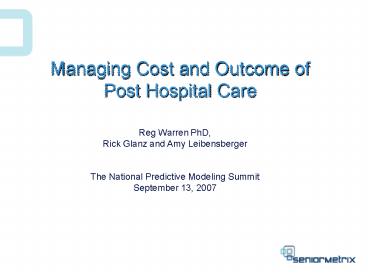Managing Cost and Outcome of Post Hospital Care - PowerPoint PPT Presentation
1 / 28
Title:
Managing Cost and Outcome of Post Hospital Care
Description:
1/3 of hospitalized seniors will receive post acute care ... Grooming. Bathing. Dressing Upper Body. Dressing Lower Body. Toileting. Bladder Management ... – PowerPoint PPT presentation
Number of Views:69
Avg rating:3.0/5.0
Title: Managing Cost and Outcome of Post Hospital Care
1
Managing Cost and Outcome of Post Hospital Care
Reg Warren PhD, Rick Glanz and Amy
Leibensberger The National Predictive Modeling
Summit September 13, 2007
2
The dilemma for post hospital care?
- MCOs spent 7.9B on SNF and Home Health in 2005
(MedPac 2007) - 1/3 of hospitalized seniors will receive post
acute care - 1/3 of those will not go to the most appropriate
setting - Misalignment of incentives per diem
- High degree of practice variation
- Over-utilization unnecessarily exposes members to
institutional risks
3
Managing Cost and Outcome of Post Hospital Care
- Diagnosis vs Function
- The Predictive Model
- Regression
- Severity adjustment
- Application
- Real-time decision support
- Retrospective comparison
- Influence on cost and outcome
4
Key Predictor
People go to the Hospital because they are
Sick Disease Driven
Treat the Illness
Acute
People get postacute care because they are frail
and Care Dependent Function Driven
Restore the Ability
Postacute
5
Functional Measurement
- Functional Independence Measure - FIM (18-126)
- Eating
- Grooming
- Bathing
- Dressing Upper Body
- Dressing Lower Body
- Toileting
- Bladder Management
- Bowel Management
- Bed, Chair, WC Transfer
- Toilet Transfer
- Tub/Shower Transfer
- Walk/WC
- Stairs
- Expression
- Comprehension
- Social Interaction
- Problem Solving
- Memory
6
Function Burden of Care
- Functional needs
- Drives gt90 of skilled utilization
- Admit function- predict outcome
- Discharge setting 5 points FIM equate to one
hour caregiver burden/day
7
Calibrate the Continuum
20 of SNF patients would get the same result at
home
Most Acute Rehab cases would get the same result
in SNF
SNF LOS can be reduced by 40 without impacting
functional result
Acute Discharges Sr. Population
HH Cost can remain stable even with increased
referrals
8
Managing Cost and Outcome of Post Hospital Care
- Diagnosis vs Function
- The Predictive Model
- Regression
- Severity adjustment
- Application
- Real-time decision support
- Retrospective comparison
- Influence on cost and outcome
9
- Leader in post-acute outcome measurement since
1995 - Manage over 900,000 Senior lives in SNF, Acute
Discharge, Acute Rehab, Home Health - Database of 250,000 post-acute cases
- Over 30,000 new records added each year
- California, Colorado, Washington, Maryland,
District of Columbia, Virginia, Arizona,
Pennsylvania and Tennessee - Kaiser Permanente, PacifiCare, Health Net, Group
Health Coop, and AmeriGroup - MHS Participant
10
Improvement in Function in SNF Predictable
80 yr old female with CHF, cellulitis, UTI and
prior stroke
11
Discharge Site and Functional Level(FIM 18-126)
Diagnosis, medical complexity or other social,
caregiver or medical issues may influence the
functional level at which the patient is
discharged.
12
Length of SNF Stay Less Predictable
13
Medical Complexity Scale
- Level 0 No systemic disease other than primary
diagnosis - Level 1 Pre-morbid, inactive and/or irrelevant
- Level 2 Active, relevant. Not limiting
function - Level 3 Active, relevant. Limiting function
- Level 4 Active, relevant. Severely limiting
function - Level 5 Moribund/Terminal
14
Relevant Conditions
- Restricted Weight Bearing
- Pressure Wound II, III or IV
- Vascular (non-pressure) wound
- IV
- Vent
- Hospital not currently dependent
- Currently Dependent
- Severe Obesity
- Hemodialysis
15
Regression Length of Skilled Stay
82 y/o female UTI Acute 6 days
X
(9.24)
X
(12.02)
X
(14.28)
16
How powerful is the model?
Disability Co-morbidity DPO Dx (stroke) Age Condit
ion Grouper
Therapy Intensity
17
SMTX National Comparison (60 most efficient
facilities)
Actual Values
Query
LOS 15 days DC FIM 50
LOS 21 days DC FIM 50
Pt. 30 CVA ,75 yrs, DPO 12, Adm FIM 30, and
Med Complex 4
Pts 2-30
Pt. 1 UTI, 82 yrs, DPO 31, Adm FIM 57, and
Med Complex 3
LOS 11 days DC FIM 81
LOS 14 days DC FIM 81
Best Practice Calculation LOS 13 days DC FIM
62.5
Actual Calculation LOS 18 days DC FIM 62
REGRESSION
EACH patient is case adjusted Impairment
Group Age DPO Adm FIM Med Complex
VARIANCE LOS 28 DC FIM 1
18
Managing Cost and Outcome of Post Hospital Care
- Diagnosis vs Function
- The Predictive Model
- Regression
- Severity adjustment
- Application
- Real-time decision support
- Retrospective comparison
- Influence on cost and outcome
19
High Practice Variation
Expectations
Full Recovery
Treatment
Actual Result
Discharge Planning
Assessment
No Recovery
Postacute Episode
20
Real-Time Decision Support
21
Reduced Practice Variation
Value Added
Treatment
Most Likely Result
Discharge Planning
Actual Result
Assessment
Expectations
Postacute Episode
22
Retrospective ComparisonSeverity-Adjusted
Comparison
12
23
Managing Cost and Outcome of Post Hospital Care
- Diagnosis vs Function
- The Predictive Model
- Regression
- Severity adjustment
- Application
- Real-time decision support
- Retrospective comparison
- Influence on cost and outcome
24
SNF LOS Variance Trend
Client Q3, 2006 Source SMTX
25
Functional recovery Across Settings SNF thru HH
to Follow-up 11-01 to 9-05
SNF all dc home HH all admitted from SNF Follow
up all records (N1259)
Source SMTX
26
Improving Acute DC Placement
27
Influence on Utilization
- Average Medicare Plan
- LOS 22 days
- SNF Admits/k 50-65
- SNF Days/k 900-1100
- PMPM 33
- Predictive Model Results
- LOS 16 days
- SNF admits/k 40-50
- SNF days/k 600- 800
- PMPM 22.50
28
Reducing Practice Variation Using Predictive
Models
11































